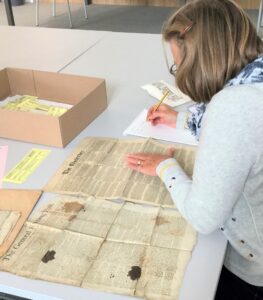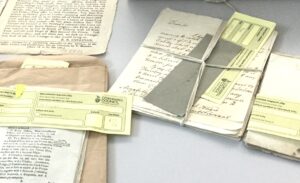My books are set on the south coast of Cornwall, 1793-1800, so it’s wonderfully fitting that Cornwall’s new archive centre has moved to the old Redruth Brewhouse, built in 1792. The former Brewery has been transformed and incorporated within it is Kresen Kernow which houses 1.5 million records, covering 850 years of Cornish history. I believe there are fourteen miles of shelving!
 I loved the Records Office in Truro, but this new centre is fabulous. Starting with the user friendly catalogues, the e-mail lists of chosen archives, the spacious research rooms, and the efficient and charming archivists, it adds to the serious problem of deciding when to stop researching and start writing!
I loved the Records Office in Truro, but this new centre is fabulous. Starting with the user friendly catalogues, the e-mail lists of chosen archives, the spacious research rooms, and the efficient and charming archivists, it adds to the serious problem of deciding when to stop researching and start writing!
But I’m getting ahead of myself. Other writers tell me they start with a kernel of an idea, a spark that fires their interest, and they expand it from there. I, however, like to start with the whole picture, gradually narrowing it down to the themes I want to explore.
I began my journey into historical fiction knowing the place I wanted to set my stories in – an area I have loved for thirty years. The date was an easy decision because since my Open University degree I’ve been mildly obsessed with the end of the Eighteenth Century, and as the books were to be set on the coast I had a community of shipbuilders, fishermen, clay speculators, merchants, and landowners around whom I could weave my stories.
Hoping my books might make a series, I decided to keep separate areas of research for each book and not cram everything into the first. It was a matter of holding back. Britain was at war with France and the areas I wanted to research were the high levels of bankruptcy among shipbuilders, raising the Volunteer Militia in the face of the very real threat of invasion, the patent row between the engine builders Boulton and Watt and how it impacted Cornish mining, the influx of French prisoners into the prisons, and building the new Infirmary. So much, and yet there is still so much I haven’t mentioned.
We are spoilt for on-line information. The touch of a key brings facts, dates, names, portraits, maps. We can access academic research papers detailing the lives of shipbuilders, midshipman, physicians tackling tropical fevers and the stories in my head slowly become plausible. But I need to know what I say happens could have happened. Every detail is checked – every inn, every stagecoach, every boatyard, even evidence of a French dressmaker in Truro.
 I march round the area. I have a plot that could have happened to people who could have lived in the houses I identify. I have the setting, the time, the characters but missing is the most vital aspect of all – authentic voices of people living at the time.
I march round the area. I have a plot that could have happened to people who could have lived in the houses I identify. I have the setting, the time, the characters but missing is the most vital aspect of all – authentic voices of people living at the time.
And that’s where the days previously spent in the Records Office are now spent in the stunning Kresen Kernow. I only feel able to start a new book when real voices jump at me from the pages of primary sources – the threat of invasion, the woeful state of the sea defences, the lists of returns in case of subscription. The writs and legal wrangling that kept the price of tin high. The building of the sea-lock, details of rents charged to the tenants in the new harbour, Charlestown. The shambles at Pendennis Castle. The Naval ships awaiting orders in Falmouth.
The words they use, their tone, their sense of urgency or frustration leap from the pages. I can hear my characters and I can finally start writing.
Find out more about Nicola and her novels at: https://nicolapryce.co.uk/
